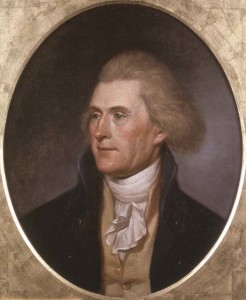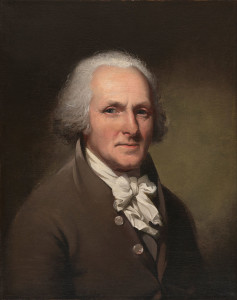But I think I have observed that your countrymen who have been obliged to work out their own fortunes here, have succeeded best with a small farm. … It is at the same time the most tranquil, healthy, and independent. –Thomas Jefferson April 29, 1795
If you know me, you know that I have a fondness for the Founding Fathers. I see them as men with great wisdom before their time. I give them, and God credit for the founding of the United States and the ability to setup a form of government that has lasted since 1776. I like to read their sayings, their writings and their letters. In doing so, I have come to understand them better, and to gain a greater appreciation for the country that I call home and love.

Portrait of Thomas Jefferson by his friend CW Peale (1791)
Thomas Jefferson had a friend Charles Willson Peale that exchanged letters with him off and on. CW Peale was a known painter (he did this famous portrait of Thomas Jefferson), soldier, scientist, inventor, politician, and naturalist. He also started a natural history museum that included the skeleton of a mastodon that was found, excavated, and mounted by Peale himself.
Jefferson and Peale wrote to each other for years. The first letter was recorded in 1791. They continued writing to each other until 1826. The Jefferson Papers contain 188 letters between Jefferson and Peale. You can find them at founders.archives.gov.
There was a letter written by Thomas Jefferson to CW Peale on the 20th of August 1811. The August 20th letter contained this quote:
I have often thought that if heaven had given me choice of my position and calling, it should have been a rich spot of earth, well watered, and near a good market for the productions of the garden. No occupation is so delightful to me as the culture of the earth, and no culture comparable to that of the garden.
There are a lot of other quotes form the founding fathers that talk about their love for farming, agriculture and gardens. Jefferson ends his letter with this statement, “Think of me sometimes when you have your pen in hand and give me information of your health and occupations, and be always assured of my great esteem and respect.”
A few weeks later, Peale responds to Jefferson’s letter with a lengthy letter on September 9th, 1811.
I am most cheerfully accept your kind invitation of a renewal of correspondence … I shall get instruction in my new occupation, that of a famer, which thus may be diffused to others, as I am willing to put into practice every thing that promises to meliorate the condition of Man.

CW Peale, Self-portrait (1791)
Peale then writes a lengthy letter to Jefferson about what he is doing on his farm. I am going to include some excerpts from this letter in the post. I am hoping that the knowledge of these patriotic farmers will transverse the gap of time. I feel the same way today as Peale did when he wrote his letter to Jefferson. In a way, I want to also diffuse the information I have and will learn to others. It is my hope that others will be able to gain insight from our little farm’s failures and successes, and it a small way will also help meliorate the condition of man.
In the letter, Peale starts out by thanking Jefferson for his design of a Mould-board (curved metal blade in a plow that turns the earth over). He talks about how he is using Jefferson’s idea to create new plow. Peale states, “if the form of it was given to every Plow, the land would be infinitely better plowed; greater products consequently, withall less labour to Horses.” He then goes into detail on how to produce the Mould-board out of White-oak.

Drawing of Mould-board by CW Pearle.
He then discusses the museum, and how he wants to retire from it. He convinced his son to take over the museum, so he could “be out of sight, by retiring to the Country, to muse away the remainder of my life.”
You ask whether “the farm is interresting?” my answer is that it is exactly what you would wish, “a rich spot of Earth, well watered, and near a good market for the produce of the Garden.” I am situated ½ a mile from Germantown and have the same distance to the old-york turnpike road—two Streams run through my land, who’s sources are within 3 miles, on each there are 3 mills above me, from the east stream I can have 23 feet head of water, and on the other 10 feet within my own land, and liberty from my neighbours land below to add 5 feet more—This stream is the nearest to my dwelling. It is my intention as soon as I can conveniently have it executed, to Build the End of a Mill-house, which may be extended if wanted in future, my object at present is only to apply it to the saving of labour of the farm, such as churning of Butter, Grinding our tools, beating of Homony, washing of Linnen, a turn bench &c &c all of which may be performed by bands, thus expence of wheels is avoided. on the other Stream I intend to Build a Grist Mill, after my farm is put into compleat order, if I am able to make it so.
He then talks about his trying to farm on shares, but found that it was more reliable to work the farm himself and not rely on the farmer he picked who turned out to be to lazy, and the crops were always put in the ground to late.
One of my favorite parts of the letter, from Peale to Jefferson, is when he discusses weeds, and how, “I found that where I had cut off one head, Hydra-like a half dozen had sprouted up in place.” It looks like everyone has to deal with unwanted vegetation in the form of weeds.
…weeds grow so fast that the loss of labor could not be recovered, great part of my new Garden became a wilderness I am now taught to know that a garden must be constantly attended to—This is not the only mistake I have committed, even with the best intentions, I have laughed at my folly in thinking I could do wonders by my steady perseverance. I see my farm, and those of all my neighbors around having an abundance of weeds, I thought that if I cut off those weeds while in Blossom that I should prevent them from seeding, and by a persevering labor of cutting them off, I should at last have my place free of weeds…
The letter contains so much information, I strongly suggest that you read if for yourselves if you want to gain the knowledge that he is bestowing. He discusses how he grows fodder for his cattle, a machine he made to take his milk from the cow-pen to the spring-house, a three wheeled carriage to take the milk to the market, how he Kiln dries fruit, and a discussion of his fruit trees, using plaster or ash on his land, and producing potatoes.

Machine by CW Peale to move milk.

Three wheeled cart used to transport milk to the market. CW Peale
In conclusion he states the following:
Some of my friends told me that I would soon be tired of a country life, as others of their acquaintance had been. I believe my fondness for the farmers life is becoming daily stronger.
I agree with CW, the more I farm the land and enjoy the “country life” the fonder I become of it.
